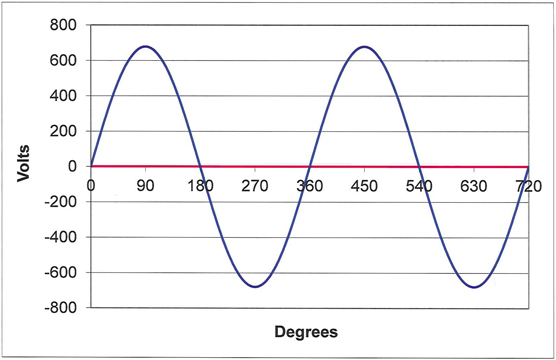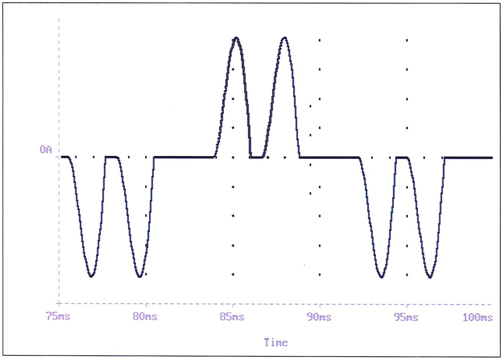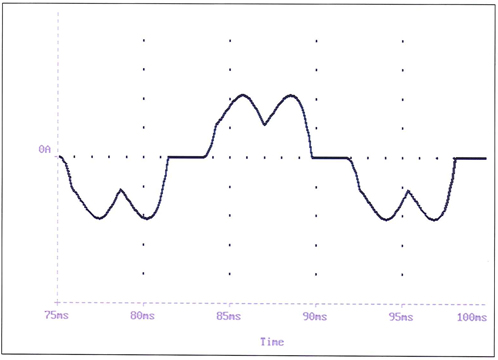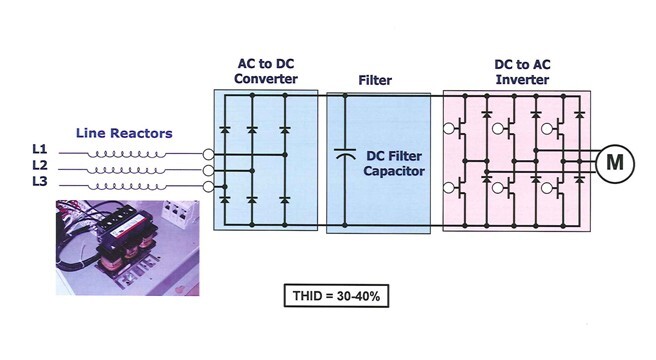How Will Line Reactors Help Your Variable Frequency Drive?
Updated on October 23rd 2025
While VFD's provide great advantages in process control and energy savings, they are also the largest cause of electrical power system pollution. Reactors have become a most common means of reducing this pollution (or dirty power) with widespread use.
Reactors do more than just clean up power. They are useful for output filtering and as a component in many types of filters. Focusing on the incoming line side of VFDs, they provide two main benefits. The first is that they protect other devices from VFDs, and the second, is that they protect VFDs from other devices.
Why Use Line Reactors for Harmonics?
To understand how line reactors help mitigate against harmonic distortion, it is important to understand why VFDs cause a problem. We dive into this problem with more detail in our blog post What is a Variable Frequency Drive, but a short overview here may help.

(Figure 1) A standard 480V AC sine wave with normal current
Standard AC power moves in a sine wave like Figure 1 above. Because most standard low voltage drives have a diode front end, they "gulp" power, opening at the peaks of the AC sine wave. This causes the waveform to turn into a "camel hump" like Figure 2 below.

(Figure 2) Current waveform on a VFD without any harmonic mitigation
Even without much electrical knowledge, the difference is easy to see, but it may help to think in terms of a water system. Think of flushing a toilet when someone is taking a shower, causing the water pressure in the shower to drop suddenly. These short bursts of current have the same effect on the power system, causing voltage drops in the power system and distortion of the voltage waveform.
The magnitude of this distortion is referred to as either Total Harmonic Current Distortion (THID) or Total Harmonic Voltage Distortion (THVD). This pollution can damage other equipment or yours or neighboring facilities. To learn more about harmonics, check out our article Variable Frequency Drive Harmonic Mitigation that dives into more depth.
How Do Line Reactors Reduce Harmonic Distortion?
Reactors are an easy way to reduce harmonics from VFDs by introducing impedance into the system. They slow the voltage rise time and absorb somewhere from 60-70% of the current distortion in the system. This leads to a wave form that looks like Figure 3. It is still not a perfect sine wave, but it is much better than without any mitigation.

(Figure 3) Current waveform of a VFD with a line reactor
Is the reduction in harmonics from a line reactor enough? It depends. North American utilities care about your harmonics at the point of common coupling (PCC), which is typically the transformer that supplies your facility with power. This means they're looking at the harmonic distortion levels for the entire facility. They often use the IEEE 519 standard which will require THVD under 5% and a varying THID based on facility size (although most facilities can use 15% as a common standard).
Imagine you have a pump station with a 5HP VFD/motor system being the only major load. That means you're still seeing somewhere from 30-40% THID at your point of common coupling, which could be an issue.
On the other side, imagine that you are running a massive manufacturing facility and this is a single 5HP VFD/motor among hundreds of other loads. A reactor will have some effect, but the way you address larger systems, like using harmonic filters, will have a bigger impact.
No matter what your situation is, you need a comprehensive plan to help your facility meet the standard set by your electrical utility. Reactors are often a core part of this strategy as a cost-effective way to reduce a large percentage of harmonic distortion.
Why Use Reactors to Protect a VFD?
VFDs are a good wat to protect your motor. They are installed between the utility and the motor, meaning any issues that come from the grid must go through your VFD. Although they can perform this function well, inverters have many delicate components that run the risk of being overloaded.
Although any equipment can be overloaded, a reactor is less susceptible to these issues. If surges or transients hit your system from the utility, they hit a line reactor before your VFD, as shown in figure 4 below. Although you may still want a surge suppressor, a reactor adds more protection. If the surge is strong enough to destroy the reactor, it is typically much less expensive to replace than a VFD.

(Figure 4) Schematic of a VFD with a line reactor installed; the utility power comes in from the left of the schematic and goes out tot he motor on the right
Some systems will have a DC link choke instead of a line reactor. The downside here is that the DC link choke is wired into the DC bus, meaning it doesn't provide any protection to the front converter section of a VFD.
When Should I Add a Reactor to a VFD System?
When should you add a reactor to a VFD system? The easiest answer is almost always the simplest. A reactor is a cost-effective way to reduce about two thirds of harmonic distortion and protect your VFD. In some cases where you have a more advanced harmonic filter it may not make sense, but that is not always the case.
Passive harmonic filters, for example, use reactors as a main component of the system. Active harmonic filters benefit from a reactor so they have less distortion to mitigate. Even 12 and 18 pulse VFDs introduce harmonic impedance, they just do it in the form of a phase-shifting transformer instead of a reactor.
What Reactor Should I Choose?
For a line reactor, you should usually be looking at a 3% impedance reactor at a minimum, although 5% is a more advanced option. 3% reactors balance cost and performance, while 5% reactors provide more protection but may slightly reduce voltage at the motor terminals. You need to consider things like application and overload. All of these factors we cover in our article about how to size a line reactor.
Even with these guidelines, systems can vary quite a bit. The experts at VFDs.com have seen it all and are here to help you figure out if a line reactor is the best option for your system, as well as which one to choose. Reach out to our team today to protect your equipment and avoid costly failures and utility penalties in the future.
